奖赏相关大脑活动调节决策缺陷与小儿抑郁症症状严重程度之间的关系
IF 5.7
2区 医学
Q1 NEUROSCIENCES
Biological Psychiatry-Cognitive Neuroscience and Neuroimaging
Pub Date : 2025-02-01
DOI:10.1016/j.bpsc.2024.06.007
引用次数: 0
摘要
背景:抑郁症(尤其是儿童抑郁症)患者奖赏敏感性降低的神经和行为指数之间的关联机制仍不清楚。奖赏积极性(Reward positivity,RewP)是奖赏处理的神经指标,一直与抑郁症相关。另外,最近使用漂移-扩散模型(DDM)对行为数据进行的研究已经确定了奖赏敏感性的计算指标。因此,本研究考察了 RewP 是否是基于 DDM 的奖赏处理指数的神经介导因素,以预测不同症状严重程度的小儿抑郁症:方法:166名8至14岁的社区女孩完成了两项任务。第一项任务是奖励猜测任务,通过脑电图计算 RewP;第二项任务是基于奖励的概率决策任务。在第二个任务中,对行为数据进行了DDM分析,以量化奖励相关证据的积累效率(漂移率)和对不同奖励选择的潜在基线偏差(起点)。抑郁的严重程度通过自我报告的儿童抑郁量表(CDI)进行测量:结果:RewP 与漂移率相关,但与起点偏向奖励更多的选择无关。此外,RewP 完全调节了向奖励更多的选项漂移的速度较慢与抑郁症状严重程度较高之间的关联:我们的研究结果表明,对奖赏反馈的神经敏感性降低可能是抑郁症状严重程度较高的儿童和青少年对奖赏行为不敏感的一种神经机制,这为在这种情况下奖赏处理的神经和计算指标之间的关系提供了新的见解。本文章由计算机程序翻译,如有差异,请以英文原文为准。
Reward-Related Brain Activity Mediates the Relationship Between Decision-Making Deficits and Pediatric Depression Symptom Severity
Background
The mechanisms that link neural and behavioral indices of reduced reward sensitivity in depression, particularly in children, remain unclear. Reward positivity (RewP), a neural index of reward processing, has been consistently associated with depression. Separately, recent studies using the drift-diffusion model on behavioral data have delineated computational indices of reward sensitivity. Therefore, in the current study, we examined whether RewP is a neural mediator of drift-diffusion model–based indices of reward processing in predicting pediatric depression across varying levels of symptom severity.
Methods
A community sample of 166 girls, ages 8 to 14 years, completed 2 tasks. The first was a reward guessing task from which RewP was computed using electroencephalography; the second was a probabilistic reward-based decision-making task. On this second task, drift-diffusion model analysis was applied to behavioral data to quantify the efficiency of accumulating reward-related evidence (drift rate) and potential baseline bias (starting point) toward the differently rewarded choices. Depression severity was measured using the self-report Children’s Depression Inventory.
Results
RewP was correlated with drift rate, but not starting point bias, toward the more rewarded choice. Furthermore, RewP completely mediated the association between a slower drift rate toward the more rewarded option and higher depression symptom severity.
Conclusions
Our findings suggest that reduced neural sensitivity to reward feedback may be a neural mechanism that underlies behavioral insensitivity to reward in children and adolescents with higher depression symptom severity, offering novel insights into the relationship between neural and computational indices of reward processing in this context.
求助全文
通过发布文献求助,成功后即可免费获取论文全文。
去求助
来源期刊

Biological Psychiatry-Cognitive Neuroscience and Neuroimaging
Neuroscience-Biological Psychiatry
CiteScore
10.40
自引率
1.70%
发文量
247
审稿时长
30 days
期刊介绍:
Biological Psychiatry: Cognitive Neuroscience and Neuroimaging is an official journal of the Society for Biological Psychiatry, whose purpose is to promote excellence in scientific research and education in fields that investigate the nature, causes, mechanisms, and treatments of disorders of thought, emotion, or behavior. In accord with this mission, this peer-reviewed, rapid-publication, international journal focuses on studies using the tools and constructs of cognitive neuroscience, including the full range of non-invasive neuroimaging and human extra- and intracranial physiological recording methodologies. It publishes both basic and clinical studies, including those that incorporate genetic data, pharmacological challenges, and computational modeling approaches. The journal publishes novel results of original research which represent an important new lead or significant impact on the field. Reviews and commentaries that focus on topics of current research and interest are also encouraged.
 求助内容:
求助内容: 应助结果提醒方式:
应助结果提醒方式:


